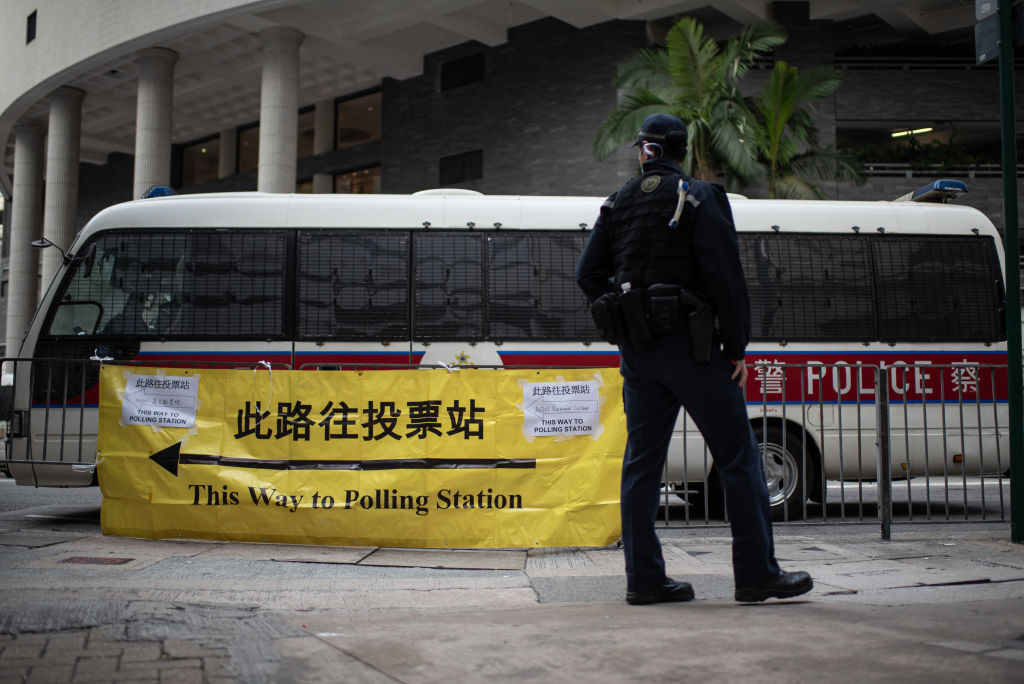
A symphony of mobile phone notifications trilled across Hong Kong on Saturday as residents received text messages reminding them to vote in the legislative election. But most Hong Kongers chose to stay away from the “patriots only” election Sunday—the first since Beijing revamped the semi-autonomous territory’s electoral system to allow only those loyal to China to run.
Many pro-democracy figures and experts say that the low turnout is directly tied to the lack of meaningful opposition: Dozens of pro-democracy figures are in jail and several others have fled. Others declined to participate in the election.
The election overhaul, passed in May, also meant voters have less choice in who governs Hong Kong. Both the number and proportion of directly elected seats in the city’s legislative council, commonly known as “LegCo,” was reduced. Originally, voters picked 35 of the 70 seats in the chamber, now they select 20 out of 90 seats. The remainder of the lawmakers are chosen by special interest groups and Beijing loyalists. Candidates must also be vetted and approved by a government committee—ensuring that “patriots only” were on the ballot.
But despite efforts by the Hong Kong government to get people to the polls—including a $430,000 ad campaign in local newspapers and free public transportation on election day—many Hong Kongers stayed away from the city’s first “patriots only” election.
About 30% of Hong Kong’s 4.5 million registered voters cast ballots for LegCo—lower than the previous record of 43% in 2000. (By comparison, more than 58% of registered voters turned out for the last LegCo elections in 2016. More than 70% of voters turned out to elections for local district councils in November 2019).
Officials took a hardline approach to anyone who suggested that Hong Kongers should not participate in the election. Earlier this month, a senior Hong Kong official threatened “necessary action” against the Wall Street Journal over an op-ed that said boycotts and blank ballots “are one of the last ways for Hong Kongers to express their political views.” Ahead of the election at least 10 people were arrested for allegedly inciting people not to vote or to cast invalid votes.
More from TIME
Dennis Kwok, who served as a pro-democracy legislator from 2012 to 2020, tells TIME that many Hong Kongers don’t feel the new system has credibility. “They locked up all candidates and changed the rules,” says Kwok, who was unseated in 2020 after China’s top legislative body adopted a resolution that allowed local officials to remove “unpatriotic” lawmakers. He is now a senior fellow at Harvard Kennedy School. “Hong Kong people feel there is no point in participating,” he says.
Chief Executive Carrie Lam, however, told Chinese state-run tabloid the Global Times ahead of the election that low turnout would be meaningless. “There is a saying that when the government is doing well and its credibility is high, the voter turnout will decrease because the people do not have a strong demand to choose different lawmakers to supervise the government,” she said.
The rejiggering of the electoral system was part of a crackdown on dissent in the former British colony in response to unrest that began as peaceful mass protests in the summer of 2019. The demonstrations morphed into violent street battles, which threw the city into chaos, frequently shuttering businesses, choking traffic and shutting down public transport—even briefly forcing the closure of the city’s international airport. Protesters lit pro-Beijing businesses on fire, and broke into and vandalized the LegCo chamber.
Beijing’s clampdown also saw the imposition in June 2020 of the sweeping National Security Law that criminalizes secession, subversion, terrorism and collusion with foreign forces with penalties of up to life imprisonment. More than 150 people have been arrested under the law, including dozens of democratic lawmakers who participated in unofficial pre-election primaries in July 2020—declared illegal under the law.
Read More: Column—The Only Path Ahead for Hong Kong Is Reform
The election was originally scheduled for September 2020, but the government delayed it by more than a year, citing COVID-19 concerns. Hong Kong is currently one of the few places in the world with zero locally transmitted COVID-19 cases—thanks to stringent entry requirements, including 21 days of hotel quarantine.
Officials also defended the new electoral system—saying the rules were needed to keep Hong Kong secure. During the protests, tensions flared inside LegCo, leading to deadlocks and in one instance, a physical fight, as lawmakers scrambled to physically take control of the chairperson’s seat for a key legislative committee. In May 2020, a pro-democracy lawmaker dropped a container of rotting plants in the chamber during debate over a controversial national anthem law.
Xia Baolong, the director of Beijing’s Hong Kong and Macau Affairs Office, said on Dec. 6 that Hong Kongers had wasted time “blindly seeking Western-style democracy.” “It brought social divisions, vicious fights, causing crises such as a disorderly society, an imbalanced economy and ineffective governance,” he said.
Following the election Monday, Beijing released a report that judged the election reforms successful, saying they would ensure the long-term development of democracy in Hong Kong.
More Must-Reads from TIME
- Cybersecurity Experts Are Sounding the Alarm on DOGE
- Meet the 2025 Women of the Year
- The Harsh Truth About Disability Inclusion
- Why Do More Young Adults Have Cancer?
- Colman Domingo Leads With Radical Love
- How to Get Better at Doing Things Alone
- Michelle Zauner Stares Down the Darkness
Write to Amy Gunia at amy.gunia@time.com